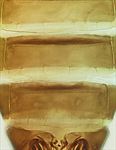
Antenna

Head

Pronotum

Meso & metanotum and tergites I–II

Tergites VIII–X

Sternites V–VII

Male sternites V–VIII

Male tergites VIII–IX
Distinguishing features
Female aptera. Body, legs and antennal segments I–III yellow, IV–V brown at apex, VI–VIII brown. Antennae 8-segmented; segment I without dorsoapical setae; III with curved simple sense cone, IV with forked sense cone. Head projecting in front of eyes, swollen over base of antennae; ocelli not developed; 3 pairs of ocellar setae, pair III small and close to compound eyes; two pairs of postocular setae, the median pair displaced toward posterior. Maxillary palps 3-segmented. Pronotum wider at posterior than anterior, with one pair of long posteroangular setae, one pair of posteromarginals. Mesonotum and metanotum transverse; metanotal campaniform sensilla absent. Tergites without craspedum, transverse reticulation extends across median area; campaniform sensilla close to posterior margin; tergite IX anterior campaniform sensilla present, medio-dorsal setae small and weak; marginal setae S1 and S2 stout but pale. Sternites without discal setae; median setae on VII at posterior margin.
Male aptera. Similar to female in colour and structure; tergite IX with 2 pairs of short thorn-like setae medially; sternites III–V with transverse pore plate, small and oval on VI.
Related species
The genus Physemothrips includes two species, although P. hadrus from islands south of New Zealand is possibly merely a large form of P. chrysodermus from Macquarie Island. These species are not known from continental Australia or Tasmania.
Biological data
Feeding on the leaves of native grasses [Poaceae].
Distribution data
Auckland Islands (south of New Zealand), and Macquarie Island.
Family name
THRIPIDAE - THRIPINAE
Species name
Physemothrips chrysodermus Stannard
Original name and synonyms
Physemothrips chrysodermus Stannard, 1962: 934.
References
Mound LA & Walker AK (1982) Terebrantia (Insecta: Thysanoptera). Fauna of New Zealand 1: 1–113.